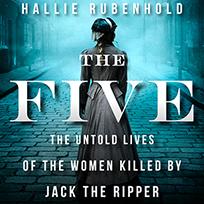 The Five: The Untold Lives of the Women Killed by Jack the Ripper by Hallie Rubenhold
The Five: The Untold Lives of the Women Killed by Jack the Ripper by Hallie Rubenhold Narrator: Louise Brealey
Published by Highbridge on October 8, 2019
Genres: Biography, History, Nonfiction
Length: 10 hours 19 minutes
Format: Audio, Audiobook
Source: Audible
Buy on Amazon, Buy on Bookshop
This post contains affiliate links you can use to purchase the book. If you buy the book using that link, I will receive a small commission from the sale.
Goodreads
Five devastating human stories and a dark and moving portrait of Victorian London—the untold lives of the women killed by Jack the Ripper.
Polly, Annie, Elizabeth, Catherine, and Mary-Jane are famous for the same thing, though they never met. They came from Fleet Street, Knightsbridge, Wolverhampton, Sweden, and Wales. They wrote ballads, ran coffee houses, lived on country estates; they breathed ink-dust from printing presses and escaped people-traffickers. What they had in common was the year of their murders: 1888. The person responsible was never identified, but the character created by the press to fill that gap has become far more famous than any of these five women.
For more than a century, newspapers have been keen to tell us that "the Ripper" preyed on prostitutes. Not only is this untrue, as historian Hallie Rubenhold has discovered, but it has prevented the real stories of these fascinating women from being told. Now, in this devastating narrative of five lives, Rubenhold finally sets the record straight, revealing a world not just of Dickens and Queen Victoria, but of poverty, homelessness, and rampant misogyny. They died because they were in the wrong place at the wrong time—but their greatest misfortune was to be born a woman.
This book was very moving. I cried twice: while listening to the Introduction and while listening to the Conclusion/A Life in Objects. What I particularly appreciated about this book is that it focused on what is known about the five canonical victims of Jack the Ripper and not what he did to them. The book also did not focus at all on the killer himself. I appreciated this fresh approach. One problem I have with true crime as a genre is the way it can be overly glib about horrific crimes; people forget that real people were at the center of these crimes. Hallie Rubenhold handled the story of each woman gracefully. She has done a wealth of research into these women’s lives. The great tragedy that seemed to be at the heart of most of their stories was that they were poor and struggled with alcoholism. Rubenhold argues that the women have been dismissed as sex workers, the implication being that perhaps the world was better off after they were killed. However, not only is it untrue that they were all sex workers—as though that even means they deserved what happened to them, which Rubenhold also dismisses—but she also emphasizes their relationships with family members, loved ones, and friends. This book was a refreshing biography and should be the model for other books about famous crimes. It’s a shame that we, as a people, are more fascinated by a psychopathic misogynist than the women he killed.